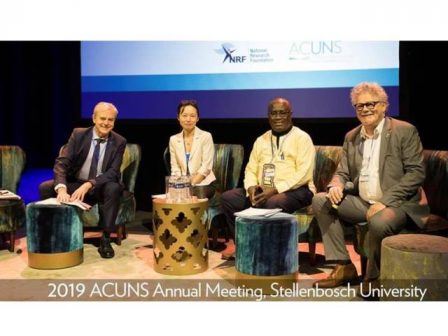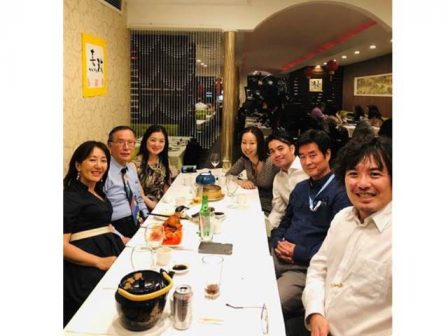The other panelists were Mr. Kwesi Aning, Director, Faculty of Academic Affairs & Research, Kofi Annan International Peacekeeping Training Centre, and Mr. Jean-Luc Lemahieu, Director Division for Policy Analysis and Public Information, UN Office on Drugs and Crime (UNODC).
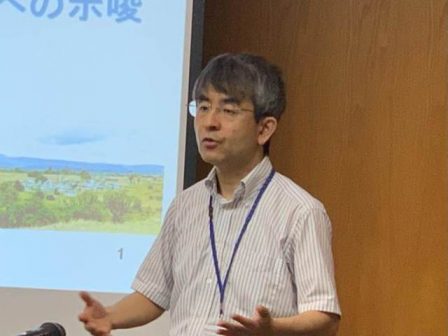
“Constructive Ambiguity” plays a Key Role in keeping stability in South Africa (22/06/2019)
Chief JICA Researcher Hiroaki Shiga explains how the compromises have been made concerning the land reform in South Africa since the African National Congress took over power in 1991 (Reported by Fujiko Amano)
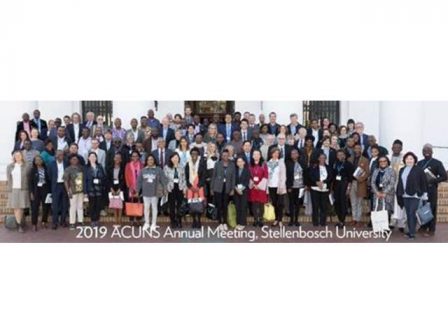
Six Japanese participate in the 2019 ACUNS Annual Meeting held at Stellenbosch University in South Africa. (22/06/2019)
ACUNS Annual Academic Meeting was held at Stellenbosch University, South Africa. Six Japanese academic participated in the event. At the Plenary, Kihara-Hunt Ai, University of Tokyo served a panelist. The Japanese scholars who presented papers are Hiromi Fujishige, Associate Professor, Aoyama Gakuin University, Ayako Inokuchi, Doctoral student, Osaka School of International Public Policy, Osaka University, Professors Yasushi Katsuma, Waseda University, Yasue Mochizuki of Kwansei Gakuin University and Yasuhiro Ueki of Sophia University. For more detail, see https://acuns.org/am19-plenary-sessions/
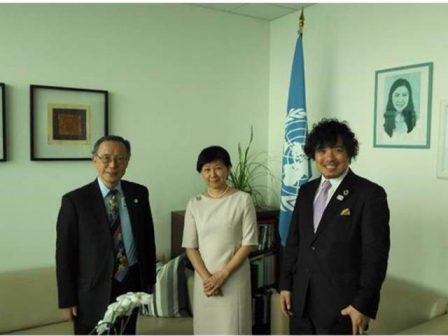
United Nations Under-Secretary-General and High Representative for Disarmament Affairs, Ms. Izumi Nakamitsu, received Global Peacebuilding Association President Sukehiro Hasegawa and Secretary-General Masakuni Tanimoto. (07/06/2019)
At the invitation of the Friends of the United Nations – Asia and the Pacific (FOUNAP), former Special Representative of Secretary-General Kofi Annan for Timor-Leste, Mr. Sukehiro Hasegawa, participated on 6 June in an interactive forum highlighting Japanese initiatives which promoted the Sustainable Development Goals. He then took the opportunity to make a courtesy call on United Nations Under-Secretary-General and High Representative for Disarmament Affairs, Ms. Izumi Nakamitsu on 7 June 2019. (Reported by Masakuni Tanimoto)
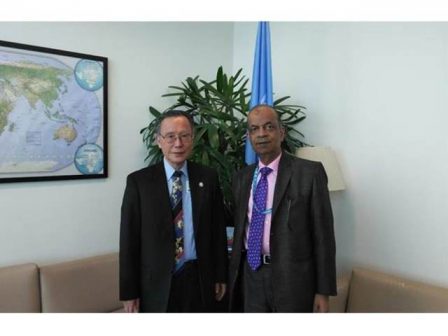
United Nations Under-Secretary-General for Operational Support Atul Khare meets President of the Global Peacebuilding Association of Japan Sukehiro Hasegawa. (07/06/2019)
Mr. Atul Khare is the Under-Secretary-General for Operational Support…
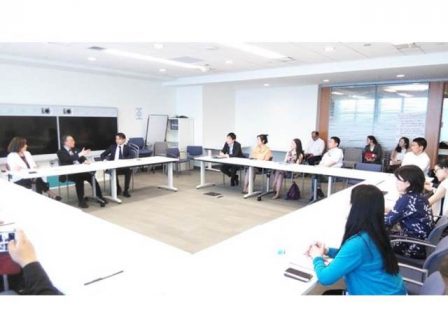
GPAJ President Sukehiro Hasegawa exchanges views and understandings about the role of UN staff and their career development in the United Nations at a gathering organized by the Japanese UN Staff Association in NY. (07/06/2019)
In his presentation to Japanese staff at UN Headquarters, Mr. Hasegaw…
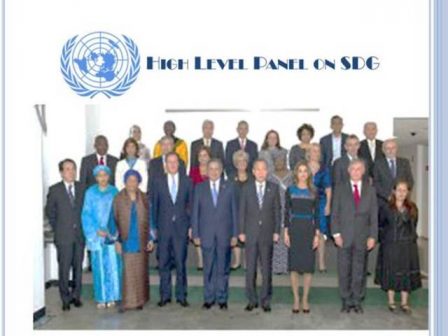
SDG Interactive Forum Meeting at UN Headquarters: Japan urged to reduce its gender gap and achieve SDG 5. (06/06/2019)
At an Interactive Forum Highlighting Japanese Initiatives Promoting the Sustainable Development Goals held at the United Nations Headquarters on June 6, Global Peacebuilding Association President Sukehiro Hasegawa explained the critically important roles played by co-chairs of the High Level Panel on the Sustainable Development Goals namely Susilo Bambang Yudhoyono, President of Indonesia, and Ellen Johnson Sirleaf, President of Liberia, as well as Emilia Pires, Timor-Leste’s Minister of Finance, who instilled the spirit of self-reliance in developing their own countries.
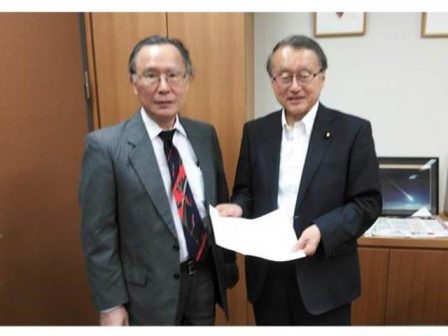
Member of the House of Representatives of the Japanese Diet and Secretary-General of the Parliamentary Committee for World Federalist Movement, Mr. Masaharu Nakagawa, discussed with the Chairman of the Japan Commission on Global Governance, the future schedule of the committee. (31/05/2019)
With the establishment of the Japan Commission on Global Governance, it was decided to hold meetings to hold discussions by experts on respective fields. They agreed to exchange views with members of the Parliamentary Committee members. The areas covered six areas including UN reform, rule of law, international solidarity tax, environment, disarmament, and SDGs. Group-wide recommendations would be submitted to the Parliamentary Committee in March 2020. (Masakuni Tanimoto, Executive Director)
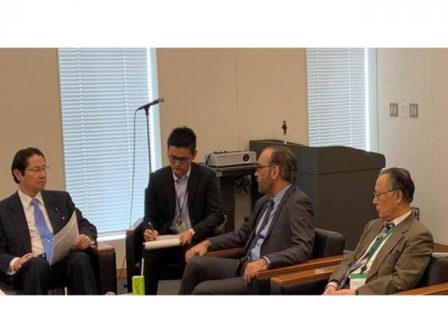
World Federalist Movement Co-Chair Fernando IGLESIAS meets Mr. Seishiro ETO and Mr. Masaharu NAKAGAWA, Chairman and Secretary-General of the Japan Parliamentary Committee for World Federalism. (28/05/2019)
Argentine legislator Fernando Iglesias, co-chair of the World Federation Movement International Office (WFM), proposed the establishment of a United Nations Parliamentary Assembly as a concrete action to make the United Nations a more democratic organization. President Seishiro Eto, indicated that to achieve world peace the Diet of Japan created the Parliamentary Committee for World Federation on as early as December 20, 1949. Chairman of the House of Representatives Komakichi Matsuoka was appointed as Chairman and Member of the House of Councilors Kotaro Tanaka as Vice-Chairman by a group of 104 bipartisan members of the Diet. He explained that about 100 members of bipartisan members have joined the Parliamentary Committee which aims at realizing the World Federation by building democratic governance.
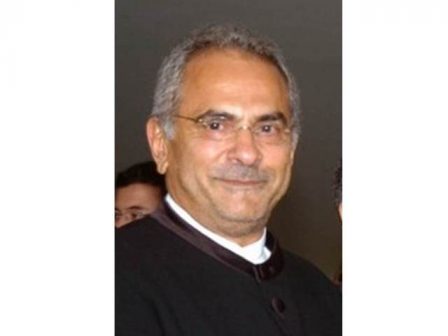
Nobel Prize Laureate and Former President of Timor-Leste José Ramos-Horta appointed Special Advisor to the Global Peacebuilding Association of Japan (GPAJ) (27/05/2019)
José Manuel Ramos-Horta is an East Timorese politician who was the President of Timor-Leste from 20 May 2007 to 20 May 2012. Previously he was Minister of Foreign Affairs from 2002 to 2006 and Prime Minister from 2006 to 2007. He is a co-recipient of the 1996 Nobel Peace Prize along with Carlos Filipe Ximenes Belo, for working “towards a just and peaceful solution to the conflict in East Timor”.
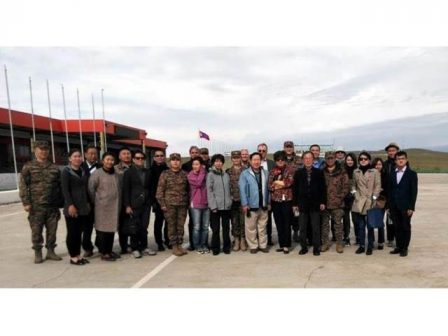
Experts from Japan, China, Republic of Korea and Mongolia Discuss Ways and Means to Strengthen Coherence, Sequencing and Prioritization of the Mandates of UN Peace Operations (23/05/2019)
Mr. Takashi Genda, Commissioned Officer Ret/Major General JASDF、Regional Director of Reven International, Professor Yuji Uesugi of Waseda University, Professor Mayumi Yamada, Ritsumeikan University and Ms. Yuko Sakurai, Former Deputy Director of the Economic Treaty Division of the Ministry of Foreign Affairs of Japan and Member Fukuya Total Law Offices participated in the Conference along with Mr. Sukehiro Hasegawa, President of the Global Peacebuilding Association of Japan, Director of the Academic Council on the UN System (ACUNS) Tokyo Liaison Office, and the Executive Director for Academic Exchange of the United Nations Association of Japan. Mr. Takakazu Ito, Senior Programme Officer of the Department of Operational Support represented the United Nations at the conference.
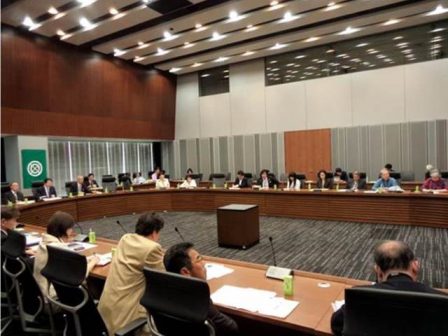
Japan Commission on Global Governance Established (15/05/2019)
The Japanese Parliamentary Commission for World Federation (JPCWF), composed of bipartisan members of the Japanese Diet, was held on May 15, 2019 in the Conference Room of the House of Councilors. Mr. Seishirō ETO, the chairman of the Parliamentary Commission, gave opening remarks and briefings for the General Assembly, and Ms. Kuniko INOGUCHI, the standing member of the Parliamentary Commission, acted as a moderator. Major political parties were represented by senior members who included Mr. Bunmei IBUKI of the Liberal Democratic Party and former Speaker of the House of Representatives, Mr. Tetsuro FUKUYAMA, Secretary-General of the Constitutional Democratic Party of Japan, Mr. Yuichiro TAMAKI, the Leader of the Democratic Party for the People (DPFP), Mr. Masahiko INOUE, Vice President of the Komeito, Mr. Akira SAKAI, Japanese Communist Party Policy Chairman, and Ms. Mizuho FUKUSHIMA, Social Democratic Party Policy Chairperson. Mr. Masahiko SHIBAYAMA, Minister of Education, Culture, Sports, Science and Technology provided his comments. The Japan Commission on Global Governance (JCG) was then established, and former United Nations Secretary-General’s Special Representative Sukehiro Hasegawa was appointed its chairman.
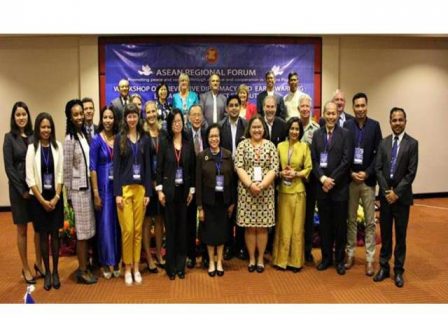
ARF Workshop on Conflict Prevent and Early Warning held in Dili, Timor-Leste (24-26/04/2019)
More than 100 government and civil society representatives of ASEAN Regional Forum countries assembled in Dili, the capital city of Timor-Leste, and shared their experiences and know-hows on conflict prevention and early warning. The participants included three members of the Global Peacebuilding Association of Japan: Sukehiro Hasegawa, Ken Inoue and Naoko Kugamai as well as Professor Uesugi of Waseda University.
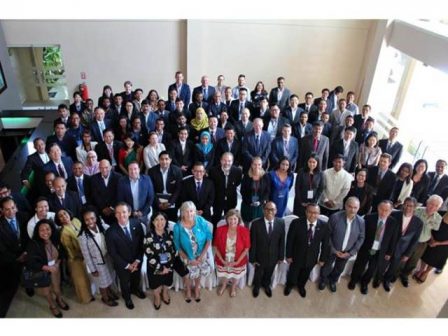
ASEAN Regional Forum on Preventive Diplomacy and Early Warning held in Dili, Timor-Leste from 24 to 26 May 2019 (24/04/2019)
Mr. Ken Inoue and Professor Naoko Kumagai of GPAJ along its president, Sukehiro Hasegawa, participated in the Forum workshop which was opened by former President Jose Ramos-Horta.
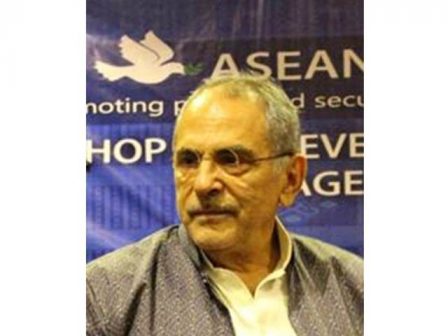
Former President José Ramos-Horta delivers a Keynote Address at the ASEAN Regional Forum Workshop on Preventive Diplomacy and Early Warning in Dili, Timor-Leste. (24/04/2019)
In his keynote speech, Ramos-Horta pays tribute to Timorese Leader Xanana Gusmão and Australian Prime Minister Malcolm Turnbull for having averted the clash of national interest by following their own conscience and doing the right thing to settle the maritime boundary disputes. Ramos-Horta also shows compliments Indonesia and India for holding free, fair and credible elections. Click here for his speech.
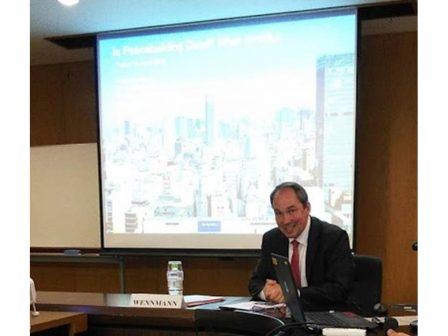
“Is Peacebuilding Dead? What Next?” (19/04/2019)
Achim Wennmann, Researcher at the Centre on Conflict, Development and Peacebuilding (CCDP) at the Graduate Institute of International and Development Studies in Geneva and Executive Coordinator of the Geneva Peacebuilding Platform made a presentation on the future of peacebuilding at the JICA, Global Plaza on Friday the 19th of April, followed by a lively discussion amongst the participants.
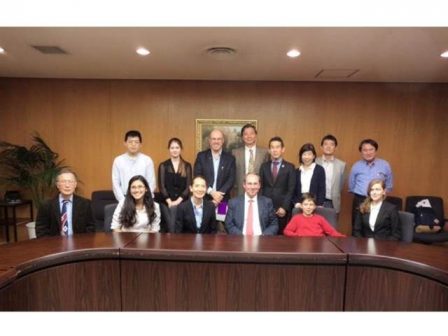
Mr. Achim Wennmann and his family (19/04/2019)
Mr. Wennmann and his family joined in a photo session the end of his presentation and discussion organized by the Global Peacebuilding Association of Japan (GPAJ)
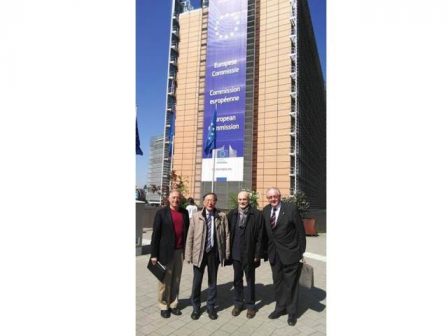
Visit to the European Union headquarters in Brussels on April 11 revealed a Birth of Omnilateralism proposed by a former member of the European Union Commission. (11/04/2019)
German Wolfgang Pape, a former member of the European Union Commission who once worked in Japan as a staff member of the European Union Commission, advocates building of a global governance structure that shares the global culture and values. By advancing omnilateralism, we can first open up the current still mainly western-inspired system of global governance to cultures and good practices of non-Western origin. Secondly, the multilateral system based primarily state actors needs to open up itself to non-state actors. This new system should embrace civil society and encompass other influential trans-border non-state actors such as the on-line giants of GAFAM (Google、Amazon、Facebook、Apple、Microsoft).

UN Volunteer Atsuhito NAKATA – “When there is something in the world that somebody has to do, I want to be the person who will do it.” (08/04/2019)
Today is the day UN United Volunteer Atsuhito Nakata and his colleague Lek Sophiep were killed on April 8, 1993. They were working together to build peace and democracy in Cambodia. In a world where nationalism is pervasive, we should reaffirm our understanding that humanity as a whole should achieve and sustain peace and democracy.
